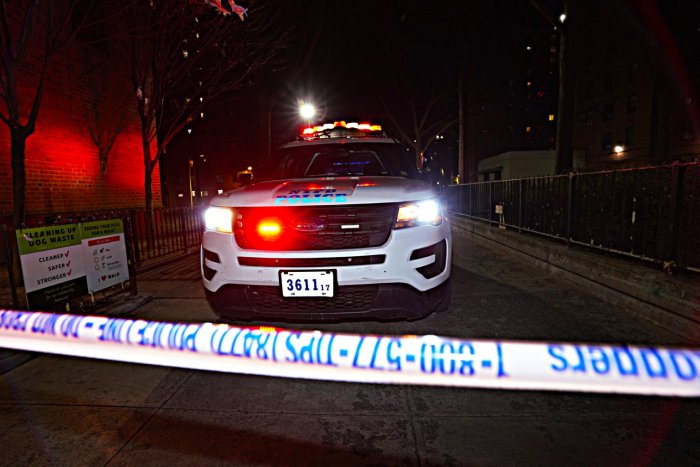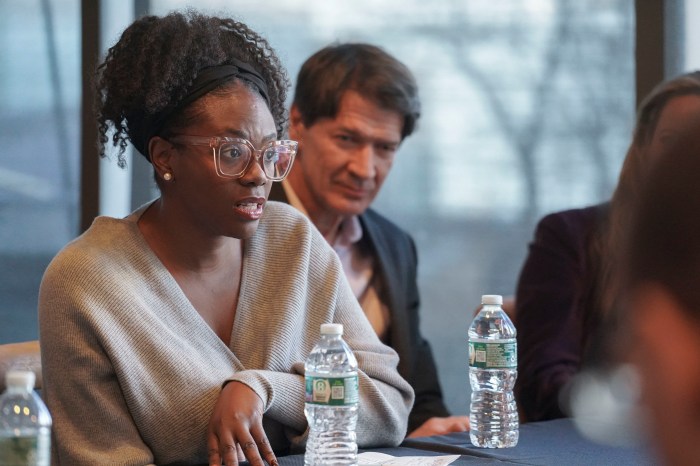By Alexander Dworkowitz
Tommy Huang, the owner of the dilapidated RKO Keith’s Theater, has permission to make the necessary repairs that could open the door to the building’s development, a city official said.
But while an employee of Huang’s indicated that the developer wanted to fix up the theater in order to sell it, a former Flushing political aide who dealt with Huang for more than a decade said he doubted Huang would ever repair the theater.
“It’s nothing that we haven’t heard before,” said John Watts, the chief of staff to former City Councilwoman Julia Harrison (D-Flushing). “It’s just been a constant series of events with him.”
Huang recently agreed to take two steps in the direction of mending his longstanding conflict with the city, said Mark Silberman, general counsel for the city Landmarks Preservation Commission.
“He’s looking to fix it up,” said Silberman.
In the meantime, Huang remained interested in acquiring Klein Farm in Fresh Meadows, the city’s last family-owned farm, despite the firestorm of criticism that news of the pending purchase had unleashed, his lawyer, Sheldon Lobel said.
Huang bought the RKO Keith’s theater at the end of Main Street on Northern Boulevard in 1986. The circa-1928 baroque theater hosted performances of Hollywood legends such as Jack Benny and Bob Hope during its heyday. The theater’s lobby and grand staircases had been designated as landmarks prior to Huang’s purchase, and inspections after the sale showed Huang had damaged the landmarked lobby.
In 1999, he was convicted on a felony count of having ignored asbestos contamination in the theater and for spilling hundreds of gallons of fuel oil in its basement. He was ordered to pay a $5,000 fine and sentenced to five years probation. The property has sat idle since.
In 2000, Huang filed a $39 million suit against the city’s Landmarks Preservation Commission. His lawyer argued that the city owed Huang the money since it prevented him from developing all of the 166,000-square-foot property because of its specifically landmarked segments.
Earlier this year Huang took two actions to better his relations with the city. First, he agreed to suspend his lawsuit against the city, said Silberman.
“There was a mutual agreement to put the lawsuit in abeyance,” Silberman said
In the second step Huang agreed to give a $40,000 security deposit to the Landmarks Commission for work restoring the damage to the theater’s lobby and staircase, said Silberman. The money that Huang will have to spend to actually fix the lobby would most likely be much more than the $40,000, the official added.
“We gave him approval to fix up the building,” said Silberman.
If Huang does make the necessary repairs, then the commission will consider approving Huang’s bid to develop the remainder of the theater, which is not landmarked and can be torn down. The lobby and staircase would remain protected.
Huang could not be reached for comment.
A woman at the Huang Development Group who would not give her name said Huang sought to repair the theater in order to sell it.
“We want to sell,” she said. “The people gave us too much headache.”
Watts said Huang had come up with similar plans in the past. He had intended to sell the property several years ago, but when it came time to sign the contract, he tripled the asking price, and the buyer backed out, said Watts.
Watts added that he thought the landmarked staircase and lobby should be moved to another location, allowing Huang to develop the remainder of the property.
“Let him do what he wants with the building,” said Watts.
Reach reporter Alexander Dworkowitz by e-mail at Timesledger@aol.com or call 229-0300, Ext. 141.


































